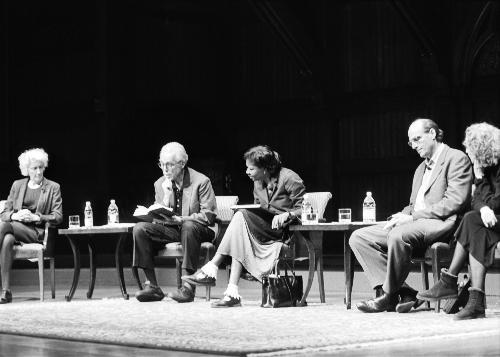
News
Cambridge Residents Slam Council Proposal to Delay Bike Lane Construction

News
‘Gender-Affirming Slay Fest’: Harvard College QSA Hosts Annual Queer Prom

News
‘Not Being Nerds’: Harvard Students Dance to Tinashe at Yardfest

News
Wrongful Death Trial Against CAMHS Employee Over 2015 Student Suicide To Begin Tuesday

News
Cornel West, Harvard Affiliates Call for University to Divest from ‘Israeli Apartheid’ at Rally
Panel Grapples With Role of Art After Sept. 11

The burden on artists to interpret and express the world is heavier after Sept. 11, prominent cultural panelists said Friday.
Luminaries James Taylor, Mandy Patinkin, Jamaica Kincaid, John Guare, Elizabeth Murray and Trisha Brown described their reactions to the recent attacks in a packed Sanders Theatre. Their theme: the song is the same, but the key has changed.
“Everything has an echo, a reverberation, that is different since the attacks,” said Patinkin, a Tony Award-winning actor. “I don’t think art itself will be any different, but it will be heard with greater echo.”
Although the artists said they had trouble keeping to their routines, they said they felt as if they had no choice.
It would be “sanctimonious to say, ‘I cannot go on with my art after this,’” said Guare, the Tony-award winning playwright of “Six Degrees of Separation.” “All we can do is just keep doing what we’re doing.”
Guare spent the two weeks following Sept. 11 writing a play, which will soon go into rehearsal.
John Rockwell ’62, editor of The New York Times Arts and Leisure section, moderated the panel, “Sprung from the Ruins.” Plummer Professor of Christian Morals Rev. Peter J. Gomes introduced the discussion with a recitation of Walt Whitman’s “On the Beach.”
The panelists shared their personal experiences on the day of the attacks.
“I couldn’t get my carcass to the studio for the first time in my life,” said Brown, founder and artistic director of the Trisha Brown Dance Company in New York City. She said she took inspiration from her students.
Taylor, a Grammy Award-winning recording artist, was in the middle of a concert tour.
“It made me more considerate of what I was doing at every moment, of the audience, and the state they were in,” he said.
If artists enjoy a privileged distance, “a high degree of being spoiled,” Murray said she hoped the events would “cut under this, in a way.”
Artists disagreed over whether they should comfort or provide “the truth at any costs,” as Patinkin called it.
“It seems that we’re afraid of bad taste, but I wouldn’t want an era of good taste,” said Guare, referring to recent self-censorship by Hollywood and Broadway. He referred specifically to composer Stephen Sondheim’s decision to postpone opening his show “Assassins” on Broadway.
Kincaid drew strong reactions from the audience for her remarks that terrorism and violence are not unique in the world. Referring to the ubiquitous slogan “God Bless America,” she countered that America is not the only nation that God should bless.
“I thought it was good that she was pointing out the larger picture, outside the privilege of celebrity, that art should point out in society what people ignore,” said James Capobianco ’99.
After the discussion, audience members posed questions using open microphones throughout the theater. Some expressed thanks for a newfound sense of hope, while others conveyed distaste for the distance celebrities still have from crisis.
“I think there’s a fascinating difference between artists of Whitman’s time, who thought their voice should make a difference, and artists who now feel they should only respond or interpret,” said Sara B. Heller ’02.
—Staff writer Rebecca M. Milzoff can be reached at milzoff@fas.harvard.edu.
Want to keep up with breaking news? Subscribe to our email newsletter.
